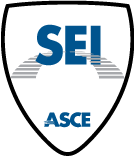This past July, SEI, in collaboration with Northeastern University, hosted a two-day workshop to develop a roadmap towards a zero-carbon future. “Towards Zero Carbon: Developing a Roadmap for the Structural Engineering Profession and the Structural Engineering Institute, ASCE” was free to attend, made possible through a generous grant from the SEI Futures Fund. SEI leaders President Jerome Hajjar Ph.D., P.E., NAE, F.SEI, F.ASCE and SEI Managing Director Jennifer Goupil, P.E., F.SEI, F.ASCE, opened the event, encouraging the large audience of educators, engineers, materials experts, and policy advocates to consider interindustry solutions during the workshop. The energy was high as the first speaker, the Honorable Brendan Owens, Assistant Secretary of Defense for Energy, Installations, and Environment, took the stage. Owens discussed his department's efforts, emphasizing a "Resilient and Healthy Defense Community Strategy" that reframes all work on Department of Defense facilities to help communities and individuals thrive through smarter, cleaner buildings and adaptive reuse.
The first presentation was followed by insights from various experts across the private and public sectors. Discussions highlighted the importance of addressing embodied carbon at its source, with an emphasis on the role of structural engineers in driving systems-level change. Key topics included the need for better Scope 3 emissions tracking, early adoption of low-carbon technologies, and the development of tools like Deloitte's "Demand Better" analytics and Building Transparency's EC3 data tool to aid in these efforts.
The federal government's role in decarbonization was also a major topic, with discussions on the Buy Clean program and its impact on materials like concrete, steel, and glass. The importance of adaptive reuse and offsite construction to reduce carbon impacts was stressed. Additionally, advancements in federal policies, such as the Inflation Reduction Act, aim to standardize and incentivize the use of low-carbon materials through programs and grants.
The morning session concluded with practical discussions on low-carbon materials including AI's potential to optimize material salvage and availability, the role of forestry in promoting sustainable construction, advancements in cement technology, and steel's role in decarbonization.
We extend our sincere thanks to our speakers for their valuable contributions:
- The Honorable Brendan Owens
- Jude Abel
- Lance Davis
- Torey Brooks
- Matthew Eckleman
- Kena David
- Benjamin Schafer
- Brandon Williams
- Max Puchtel
- Jennifer Shakun
The afternoon breakout sessions provided opportunities for all attendees to dive into details of the following six main topics:
- Resource extraction, materials processing, and fabrication
- Architectural and engineering design
- Life cycle assessment, databases, and software,
- Construction and deconstruction, and
- Policy, advocacy, and the public
The day’s educational sessions led into an evening reception and dinner hosted by Northeastern University, made possible with financial support from sponsors Charles Pankow Foundation, LeMessurier, Magnusson Klemencic Associates, SGH, and Walter P Moore.
Day two focused on identifying top priorities for the zero-carbon roadmap, with participants connecting through breakout sessions, and networking breaks. It became evident that the most popular solutions involved collaboration among people and companies. Moving forward, the SEI workshop steering committee will draft a report summarizing the workshop and highlight next steps based on the impressive progress made during the event in Boston. This report will serve as a guiding document for future initiatives and roadmaps, ensuring that the momentum from the workshop translates into tangible steps towards a zero-carbon future.
We extend our heartfelt thanks to the SEI Futures Fund for its generous support of this event, to Northeastern University for their generous financial and invaluable staff support in co-hosting and facilitating the workshop, to the sponsors for their belief in our work, and the attendees who provided valuable comments, ideas, and feedback.
Special thanks to the workshop steering committee* and breakout session leaders for their dedicated efforts to making the event a success:
- Jay Arehart*
- Don Davies*
- Matt Eckelman*
- Demi Fang
- Michael Gryniuk*
- Dirk Kestner*
- Luke Lombardi
- Emily Lorenz
- Andrew Myers
- Suzanne Robinson
- Ben Schafer*
- Elaina Sutley*
- Mark D. Webster
- Erika Winters-Downey


